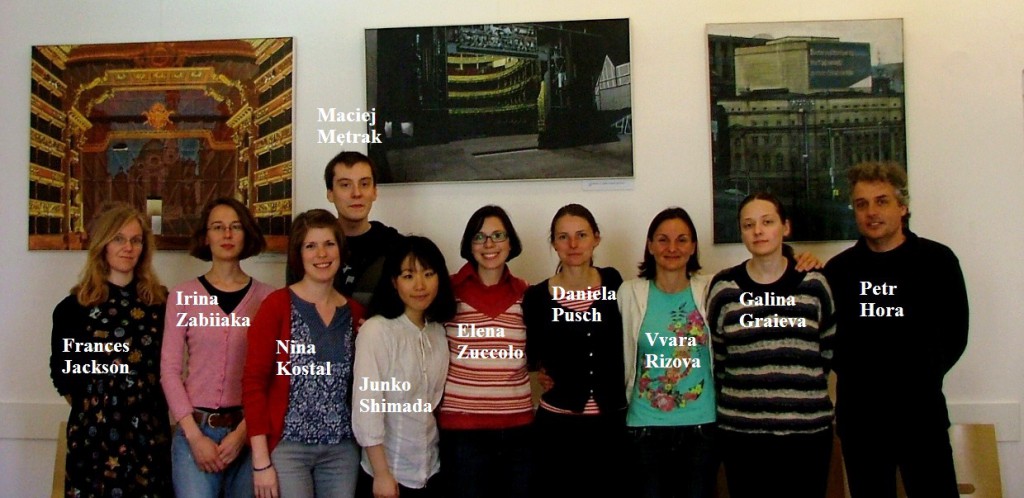The literary section of the Arts Institute, together with Czech Centres organised a competition for beginner translators on the occasion of the centenary of Bohumil Hrabal’s birth. The aim of the project was to support and promote Czech literature. A total of 138 translators entered the competition, from Germany, the Netherlands and the Flemish region of Belgium, Ukraine, Belarus, Great Britain, Spain, Italy, Russia, Bulgaria, Japan, Poland and Austria. The young translators and bohemists translated one of Hrabal’s yet untranslated short stories or an extract from longer prose, with a minimum length of 10 standard pages. The individual juries composed of bohemists, translators and publishers chose 12 winners, who were rewarded with a stay in Prague from 14-17th May. While in Prague, they took part in an intensive programme focussing on Hrabal and Czech literature in general − they met Hrabal’s friend and expert on his work Tomáš Mazal, traced Hrabal’s footsteps in Libeň with Lenka Mandová from the Prague Information Service, attended Literature Night and the Book World Prague international book fair where they met respected bohemists and also took part in lectures and discussions at the Institute of Czech Literature AS CR.All the winners were very pleased with the events in Prague. “I’m happy I was able to come to Prague, the stay here was excellently organised, I was glad to meet bohemists and translators from different countries“, said Galina Graeva from Russia.
The winner from Great Britain, Frances Jackson, explained “I wanted to take part in the competition because of my professor at Oxford, Dr. James Naughton, who died this year in February. He translated Hrabal in Great Britain. Without him I wouldn’t know Czech and so I wanted to do something for him, as I wasn’t able to attend his funeral“.
The translators were also informed about other ways they could encounter Czech literature with the help of various Czech institutions, especially about the possibility of participating in the next Bohemistics Summer School in Olomouc where the application deadline is at the end of May, in the bohemist meeting during the Month of Author Readings in Brno and Ostrava, which has a few remaining places, and with the Czech Ministry of Culture’s grant programme for translations, where the deadline for submissions is always on 15th November.
And the outlook for the future? “Based on its great success, in the coming years we would like to continue with the competition for beginner translators from Czech – we’re currently working on a new concept“, said Taťjana Langášková from the Czech Centres.
The winners
Daniela Pusch, a native of Karlovy Vary who grew up in Germany (translated the short story Perlička na dně), a graduate of slavonic and media studies in Moscow, Marburg and Brno is one of the participants in the international TransStar Europa project which supports translations of contemporary Slavonic literature into German.
Interpreter Maciej Mętrak from Poland (translated Umělé osudy and Mé přátele z dětství) studied Czech studies and ethnology, is currently completing his doctoral studies at the University of Warsaw and focuses on ethnolinguistic research.
Nina Kostal from Austria (Listopadový uragán) studied translation and interpreting in Vienna. She chose Italian, English and later Czech, as she wished to also learn a Slavonic language.
Frances Jackson from Great Britain (Polomy v lese) studied Czech and German studies at Oxford and then East European studies in Munich. In the autumn she will continue with her doctoral studies in Munich on Czech literature during the Protectorate.
Petr Hora, a Czech native living in the Netherlands (Bílý koníček), has worked as a translator for almost 20 years.
Galina Graeva from Russia (Fádní odpoledne), in 2000 she started studying at the Faculty of Theoretical and Applied Linguistics at the Russian State University for the Humanities in Moscow.
Sviatlana Rohach from Belarus (Divní lidé) started studying Czech in her second year of Slavonic studies at the Belarusian State University in Minsk.
Junko Shimada from Japan (Fádní odpoledne) is a student at Osaka University. Since 2012, she has been studying German and Czech studies at Charles University.
Iryna Zabiiaka from Ukraine (Divní lidé) studied Ukrainian and comparative literature at the Taras Shevchenko National University of Kiev. She is a candidate of philological sciences and works at the university.
Montserrat Tutusaus Romeu from Spain (To, co zbylo) studied literary theory and comparative literature at universities in Barcelona and Girona, he currently teaches spanish at a secondary school in Turnov.
Elena Zuccolo from Italy (Jeden všední den) studied translation, Czech language and literature at the University of Udine while also studying the double bass at the Prague Conservatory.
Vyara Rizova from Bulgaria (Kafkárna) is a graduate of Czech studies at the University of Sofia.
More information on the winners can be found in the Czech section of our website.
